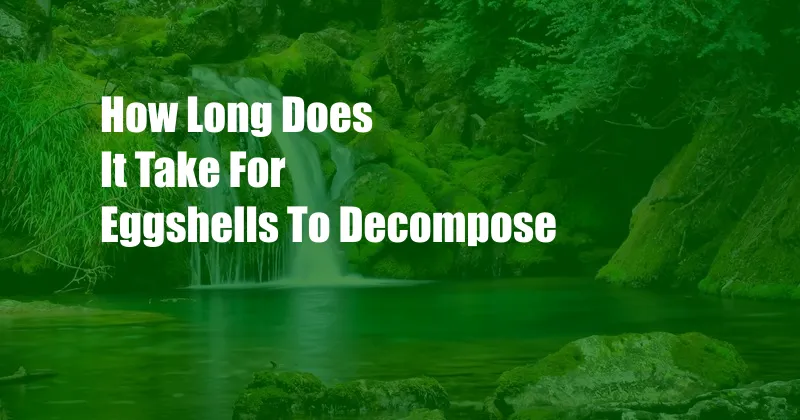
Eggshells: Nature’s Biodegradable Wonder
Eggshells—a delicate and brittle exterior protecting the delicate life within. But what happens to these shells once their purpose is fulfilled? As I stood in my kitchen, discarding the eggshells from my morning omelet, curiosity sparked within me. How long, I wondered, would these discarded fragments take to dissolve back into the earth?
My journey to unravel the secrets of eggshell decomposition began, leading me to a fascinating world of natural wonders.
The Biodegradability Journey
Eggshells, composed primarily of calcium carbonate, embark on a journey of gradual decomposition. These shells, a testament to nature’s intricate design, undergo a process of fragmentation and chemical alteration until they eventually meld with the surrounding environment.
The rate of eggshell decomposition hinges on several factors, including temperature, moisture levels, and the presence of microorganisms. In moist and warm environments, decomposition accelerates, while drier and cooler conditions slow the process.
Decomposition in the Great Outdoors
In the untamed embrace of nature, eggshells embark on a protracted journey of decomposition. As these delicate fragments lie exposed to the elements, rain and wind erode their surface, gradually breaking them down into smaller pieces.
Microorganisms, nature’s tireless recyclers, play a pivotal role in eggshell decomposition. Bacteria and fungi secrete acids that dissolve the calcium carbonate, transforming it into soluble compounds that can be absorbed by plants and incorporated into the soil.
Decomposition in Composting Environments
Composting, a controlled process of organic matter decomposition, provides an ideal setting for eggshells to break down. The warmth and moisture within compost piles accelerate the decomposition process, aided by the presence of diverse microorganisms.
As eggshells decompose in compost, they release valuable nutrients, such as calcium and magnesium, which enrich the soil and enhance plant growth. The addition of eggshells to compost heaps not only accelerates decomposition but also contributes to the overall fertility of the soil.
Tips for Faster Eggshell Decomposition
To expedite the decomposition of eggshells, consider the following tips:
- Crush the eggshells: Breaking eggshells into smaller pieces increases the surface area exposed to microorganisms, enhancing decomposition.
- Add eggshells to compost piles: The warm and moist environment of compost heaps fosters rapid decomposition.
- Bury eggshells in the soil: Submerging eggshells in soil allows them to decompose naturally, enriching the soil with valuable nutrients.
By following these tips, you can contribute to the efficient decomposition of eggshells, enriching your garden and reducing waste in the environment.
Frequently Asked Questions
- Q: How long does it take for eggshells to decompose?
- Q: Can eggshells be used as fertilizer?
Conclusion
Eggshells, a testament to nature’s intricate design, embark on a journey of gradual decomposition, enriching the environment in their wake. By understanding the factors that influence eggshell decomposition and employing simple tips to expedite the process, you can contribute to nature’s delicate balance and reduce waste.
Are you fascinated by the intricacies of eggshell decomposition? Share your thoughts and experiences in the comments below. Let’s delve deeper into the remarkable journey of these seemingly fragile fragments.